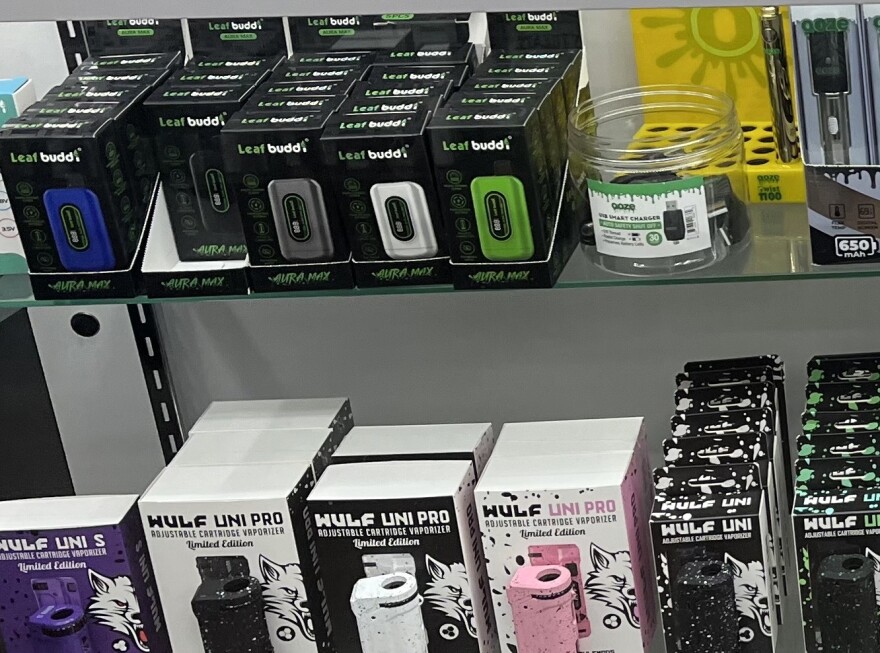Sign up for TPR Today, Texas Public Radio's newsletter that brings our top stories to your inbox each morning.
Some San Antonio students may spend more time in alternative school — or even expelled — during the upcoming school year. A provision in the new Texas school discipline law bars districts from opting out of consequences mandated by the state.
The new law also expands a list of actions requiring expulsion to include incidents that occur off campus. Beth Jones with the San Antonio Independent School District said she expects that provision to increase expulsion rates across all districts.
“I think you can take whatever level of expulsion you have and expect that that is going to be greater,” said Jones, an assistant superintendent at San Antonio ISD who oversees the student code of conduct and the district’s disciplinary hearings.
Vaping policies
In 2023, state lawmakers passed a law mandating alternative school for students caught with either a nicotine or THC vape. In response, Judson ISD and San Antonio ISD used their status as districts of innovation to give them greater flexibility in deciding consequences. However, under the new law passed this year, districts no longer have the option to adapt their school discipline policies.
Judson ISD trustees updated their district of innovation plan to comply with the new law last week, but Superintendent Milton Fields said he didn’t expect the change to impact Judson students much because they only softened their response to vapes that don’t contain THC.
“We went around [the 2023 law] by saying, in innovation, we're going to out-of-school suspension them, put them in ISS. We're going to try and fix it [on a first offense],” Fields said. “If it doesn't get fixed, then we're going to send you to alternative school.”
Because the new law mandates 10 days of in-school-suspension instead of alternative school the first time a student is caught with a non-THC vape, Fields said the state law now mirrors what their district of innovation plan said.
However, San Antonio ISD’s district of innovation plan was more expansive. In August 2024, SAISD trustees decided to give the district more discretion in deciding consequences for students caught with THC, marijuana, or alcohol in addition to vapes that contain nicotine or other non-THC substances.

“It wasn’t that we didn’t place anybody [in alternative school],” Jones said. “It provided flexibility to the district to be able to consider students on a case-by-case basis.”
Jones said the new law will definitely increase the number of SAISD students sent to alternative school, because the district will now be forced to send students to alternative school the first time they are caught with a vape that contains THC.
According to SAISD, the district sent 585 students to alternative school for vaping during the 2023-2024 school year. After trustees updated their district of innovation plan, SAISD sent just 161 students to alternative school for vaping during the 2024-2025 school year.
“When we send students [to alternative school], it does create an interruption in instruction, and it can contribute to gaps in learning,” Jones said. “You're not going to get the breadth of instruction that you would at your home campus.”
Jones said alternative schools have students from a mix of grades and classes, and even though they have access to the work their regular classes are doing, they don’t have access to their regular teachers.
“It's not the same as having AP instruction or dual credit instruction, or even just your general class,” Jones said.
Research shows removing students from class for discipline can worsen educational outcomes. According to a 2021 study published by the University of Texas at Austin, just 44% of 9th graders sent to alternative school graduated high school on time.
Expanded jurisdiction for expulsion
In addition to sending more students to alternative school for vaping, Jones also expects SAISD will have to expel more students and send them to the Juvenile Justice Academy downtown this school year.
“Parents need to know about the expansion in the jurisdiction, because I think that's going to surprise people,” Jones said.
Under the old law, districts were required to expel students if they were caught doing certain things on school property. Now, districts have to expel students no matter where the activity takes place.
“A THC vape, for any person, no matter what their age is, could theoretically be a felony charge, depending on who pulls you over,” Jones said.
THC is in a legal gray area in Texas, but products above 0.3% THC concentration are technically illegal.
Some of the activities on the list for expulsion are to be expected, Jones said, like manslaughter, arson, and kidnapping. But she expects students and families will be caught off guard by the possible consequences for vaping off campus or posting a picture holding a weapon.
Felony possession of a controlled substance and exhibiting a firearm are now mandatory expulsion under the law, no matter where the activity takes place.
“So, I'm at my friend's house, or, you know, we're hunting, I take a little like shot with me and the gun, and I post it. Now that's exhibiting. That also falls into this consideration for mandatory expulsion,” Jones said.



